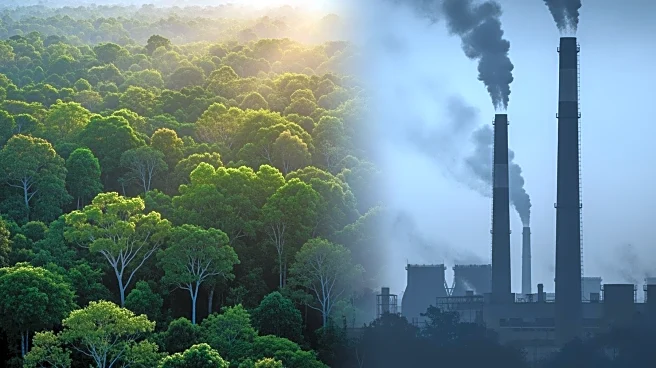What's Happening?
The COP30 climate summit in Brazil is drawing attention to the ongoing challenge of reducing global fossil fuel emissions, which are projected to reach record levels this year. Despite efforts to curb
emissions, the burning of fossil fuels continues to release significant amounts of carbon dioxide, contributing to global warming. However, the rapid expansion of renewable energy sources, particularly solar power, offers a glimmer of hope. According to the Global Carbon Budget team, emissions from fossil fuels and cement are expected to increase by 1.1% compared to last year, reaching 38.1 billion tonnes of CO2. On a positive note, emissions from electricity generation using fossil fuels are predicted to plateau or slightly decline, thanks to the growth of wind and solar energy. This development is crucial as the power sector is the largest emitter and plays a pivotal role in the transition to cleaner energy systems.
Why It's Important?
The significance of the COP30 summit lies in its potential to influence global climate policy and accelerate the transition to renewable energy. The continued rise in fossil fuel emissions underscores the urgent need for international cooperation and policy changes to achieve net-zero emissions. The growth of renewable energy, particularly solar power, is a promising development that could help stabilize emissions and eventually lead to a decline. This shift is vital for mitigating climate change impacts and achieving the goals set by the Paris Agreement. The summit provides a platform for countries to commit to more ambitious climate actions and leverage technological advancements to reduce reliance on fossil fuels.
What's Next?
The COP30 summit is expected to catalyze discussions on enhancing climate commitments and implementing effective policies to reduce emissions. Countries may announce new targets and strategies to accelerate the transition to renewable energy. The focus will likely be on increasing investments in clean energy technologies and infrastructure. Stakeholders, including governments, businesses, and civil society, are anticipated to play a crucial role in driving these changes. The outcome of the summit could influence future climate negotiations and set the stage for more aggressive actions to combat global warming.
Beyond the Headlines
The COP30 summit highlights the ethical and cultural dimensions of climate change, emphasizing the responsibility of nations to protect vulnerable communities and ecosystems. The transition to renewable energy presents opportunities for economic growth and job creation, but also challenges related to energy equity and access. The summit may address these issues, promoting inclusive policies that ensure a just transition for all. Long-term shifts in energy consumption patterns and technological innovations could redefine global energy landscapes, impacting industries and societies worldwide.









